When it comes to enhancing your home’s value and visual appeal, few upgrades make as significant an impact as choosing the right residential flooring. Whether you’re designing your dream home, renovating a fixer-upper, or simply refreshing a tired space, flooring plays a pivotal role in setting the tone for every room. But with so many options available—from classic hardwood to cutting-edge vinyl—it’s easy to feel overwhelmed.
Did you know that upgrading your flooring can yield up to a 70% return on investment when it comes time to sell your home? Beyond financial gains, the right flooring improves daily comfort, durability, and even energy efficiency.
We have provided a complete break down everything you need to know about maximizing the value of your flooring investment.
Factors to Consider When Choosing Residential Flooring
Durability: How Long Will It Last?
One of the most important factors to consider when choosing residential flooring is durability. After all, flooring is an investment that should stand the test of time, especially in high-traffic areas like entryways, hallways, and living rooms. Materials like hardwood, tile, and stone are known for their long lifespan and resistance to wear and tear, making them ideal for homes where longevity is a priority.
If you’re looking for a low-maintenance option, materials like luxury vinyl plank (LVP) or laminate flooring may be worth considering, as they are engineered to withstand scratches, dents, and fading while requiring minimal upkeep. The more durable your flooring, the fewer repairs or replacements you’ll need, ultimately saving you money in the long run.
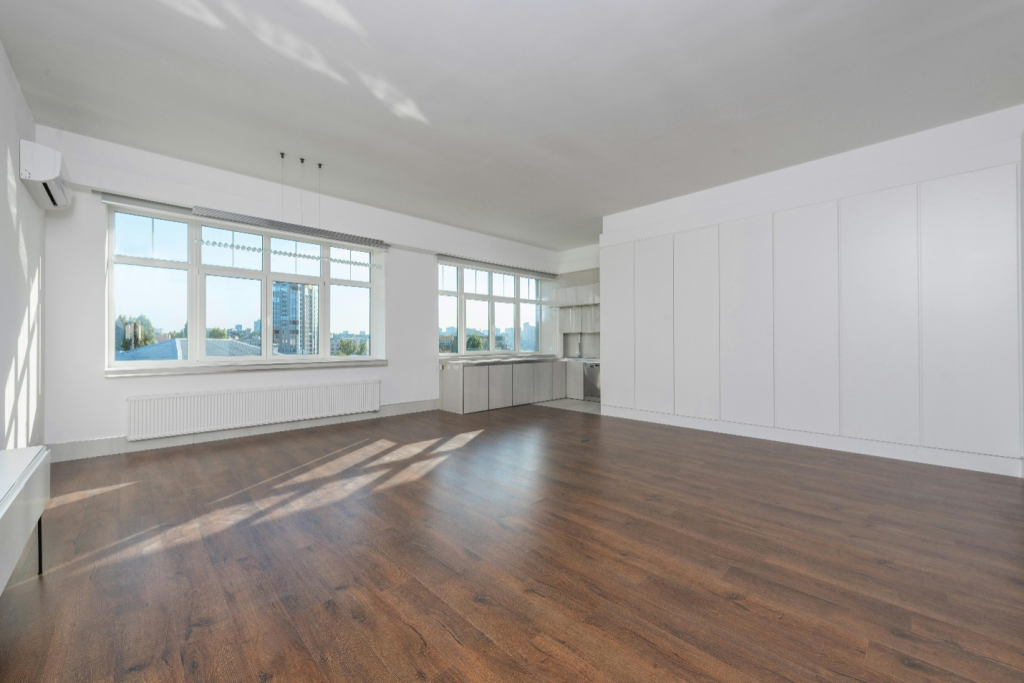
Aesthetic Appeal: Setting the Right Tone
The right flooring can transform the overall look and feel of a space. Whether you want a warm, rustic charm with hardwood, a sleek modern vibe with polished concrete, or a cozy atmosphere with plush carpeting, the style and color of your flooring are key to achieving your desired aesthetic.
Consider your home’s existing décor, the natural lighting in each room, and how the flooring will complement or contrast with your walls, furniture, and accessories. For instance, light-colored floors can brighten up a space, making it feel more open and airy, while dark floors add a sense of sophistication and warmth.
It’s also important to think about consistency. While bold and trendy designs may be appealing, sticking to timeless options, like neutral tones or natural wood finishes, ensures your flooring will remain stylish for years to come.
Budget and Cost vs. Value: Balancing Upfront Investment with Long-Term Return
Your budget will inevitably play a significant role in the type of flooring you choose. While some options, like hardwood or natural stone, come with a higher upfront cost, they offer a better return on investment when it comes time to sell your home. On the other hand, materials like laminate or carpet are more budget-friendly upfront but may not provide the same level of long-term value.
When assessing costs, consider both the material price and the cost of installation. Some flooring options, like tile or stone, may have a higher installation cost due to the labor involved, while others, like vinyl or laminate, are easier and cheaper to install.
Don’t forget about maintenance costs over time. Some floors may require periodic refinishing, sealing, or deep cleaning, adding to your long-term expenses. Be sure to weigh these costs against the initial price to make an informed decision.
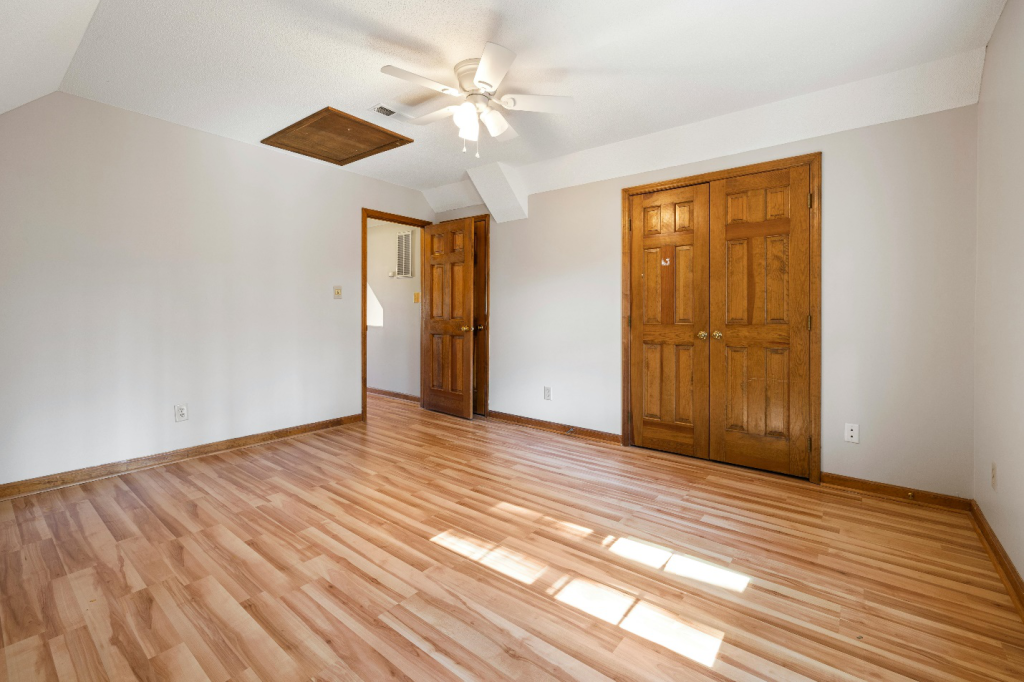
Room-Specific Needs: Matching Flooring to Function
Not all rooms in your home have the same needs, so it’s essential to consider the specific function of each space when selecting flooring. For example, bathrooms and kitchens require moisture-resistant options, such as vinyl or engineered wood. These materials are less prone to damage from water exposure and are easier to clean, making them practical choices for wet environments.
In contrast, bedrooms and living rooms may benefit from the warmth and comfort of carpeting or the timeless elegance of hardwood. If you have pets or young children, you may want to prioritize durability and ease of cleaning, which may lead you to consider materials like laminate or vinyl, both of which are highly resistant to stains and damage.
Popular Flooring Options: Pros and Cons
Hardwood Flooring
Timeless Appeal: Hardwood is a classic choice that adds warmth, character, and elegance to any room. Its natural beauty and rich texture make it highly desirable, and it complements a variety of home styles, from traditional to modern.
Increases Home Value: Hardwood floors are often considered an investment that adds value to a property. Their appeal to prospective buyers can lead to a higher resale price.
Durability: When properly maintained, hardwood flooring can last for decades. It can also be sanded and refinished to restore its appearance, giving it a longer lifespan.
Cost: Hardwood floors can be quite expensive, especially if you opt for high-quality wood or a premium finish. Installation costs can also be higher compared to other materials.
Maintenance: Hardwood is susceptible to scratches, dents, and water damage. Regular maintenance, such as refinishing and sealing, is necessary to preserve its appearance.
Vulnerable to Moisture: While hardwood is durable, it doesn’t perform well in areas with high humidity or water exposure, like bathrooms or basements.
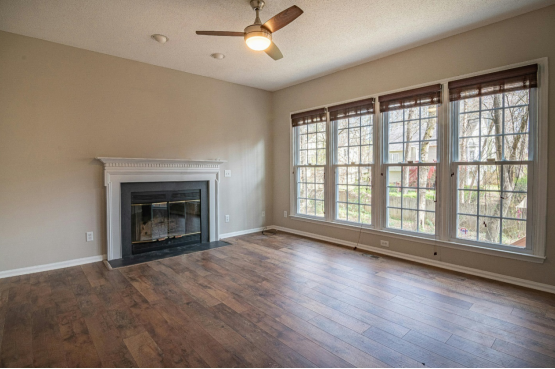
Laminate Flooring
Affordable: Laminate is one of the most budget-friendly flooring options, making it an excellent choice for homeowners looking to save on costs.
Versatility: Laminate can mimic the look of hardwood, tile, or stone, offering a wide variety of styles and finishes. It’s a great option if you want the appearance of hardwood without the high cost.
Easy Installation: Laminate flooring typically features a click-lock system, making it easy for DIY installation and reducing labor costs.
Less Authentic Look: Although laminate can imitate the appearance of real wood or stone, it lacks the authenticity and texture of natural materials.
May Degrade Over Time: Over time, the edges of laminate flooring may chip or show signs of wear, especially in high-traffic areas.
Vinyl Flooring (Luxury Vinyl Plank or Sheet Vinyl)
Waterproof and Moisture-Resistant: One of vinyl’s standout features is its ability to withstand moisture, making it an ideal choice for kitchens, bathrooms, and basements.
Variety of Designs: Vinyl flooring comes in a wide range of colors, patterns, and textures, including options that mimic the look of wood, stone, or tile.
Low Maintenance: Vinyl is easy to clean and doesn’t require regular refinishing like hardwood. It’s resistant to stains, scratches, and fading.
Affordable: Vinyl is typically more budget-friendly than hardwood, tile, and stone, making it a great option for homeowners seeking a balance between cost and aesthetics.
Environmental Concerns: Traditional vinyl flooring is made from synthetic materials, which can contribute to environmental waste. However, some options use recycled materials and low-VOC finishes.
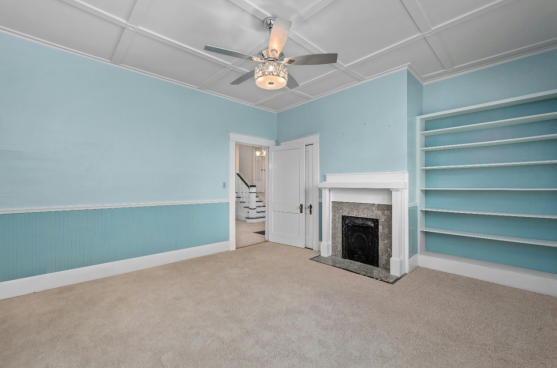
Carpeting
Comfort: A carpet provides a soft, cushioned surface that’s perfect for bedrooms, living rooms, and other spaces where comfort is a priority. It helps with noise reduction and offers a cozy feel underfoot.
Warmth: Carpeting adds warmth to a room, making it ideal for colder climates or rooms without much natural heat.
Variety and Color Options: Carpet comes in a vast range of colors, textures, and patterns, allowing you to choose the perfect option to match your interior décor.
High Maintenance: Carpets require regular vacuuming and occasional deep cleaning to prevent staining and wear. They’re also more susceptible to damage from spills, pets, and high traffic.
Not Ideal for Allergy Sufferers: Carpeting can trap dust, dirt, and allergens, making it a less-than-ideal choice for individuals with allergies or respiratory issues.
Shorter Lifespan: Carpet typically has a shorter lifespan compared to other flooring materials and may need to be replaced more frequently.
Enhancing Property Value Through Smart Flooring Choices
Impact on Resale Value
When it comes to selling your home, flooring is one of the first things buyers notice. In fact, high-quality flooring, particularly hardwood, can increase your home’s resale value significantly. Hardwood floors are especially coveted by homebuyers, as they provide a timeless appeal and a feeling of luxury. Homes with hardwood flooring can often sell for higher prices compared to similar homes with lower-quality flooring. In fact, some studies suggest that homes with hardwood floors can increase resale value by up to 2.5%, depending on the market.
That said, not all flooring choices are equal when it comes to resale value. While high-end, luxury flooring options like hardwood, stone, and tile tend to provide the best return, lower-cost options such as laminate or vinyl can also be valuable if installed correctly and in the right context. However, it’s important to avoid overly cheap or outdated materials, as these may turn buyers off or make them think that the home hasn’t been properly maintained.
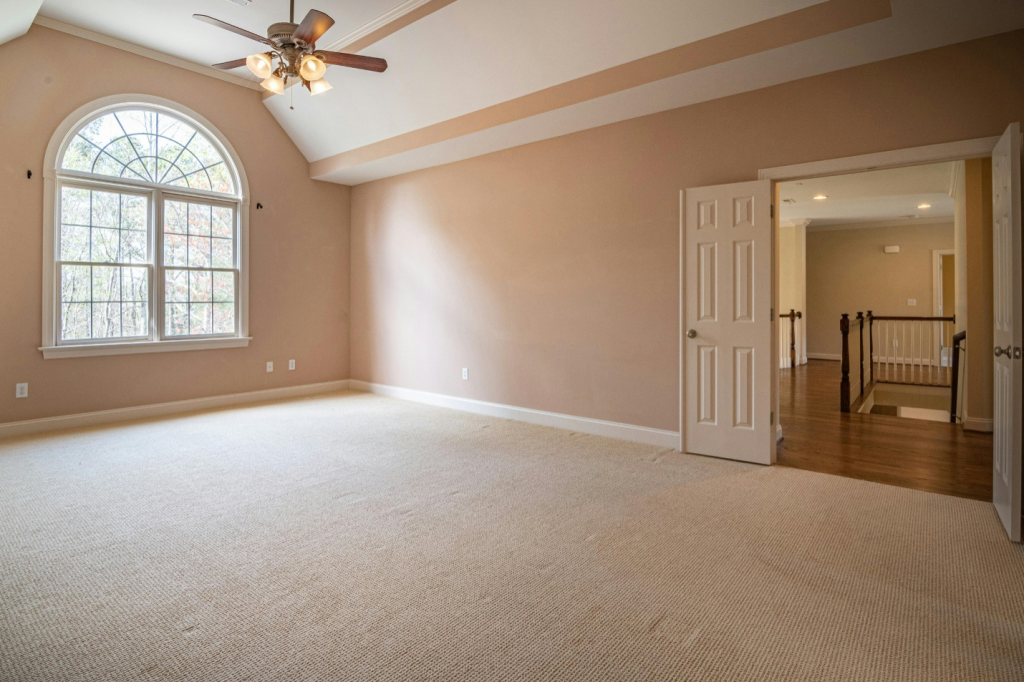
Trends vs. Timelessness
While it’s tempting to follow flooring trends, such as ultra-modern finishes or bold patterns, it’s important to keep in mind that not all trends stand the test of time. While current trends may appeal to you, they may not have the same universal appeal to potential buyers years down the road. Opting for timeless flooring choices like classic hardwood, neutral-colored tile, or high-quality stone ensures that your floors will remain stylish for years to come, no matter the shifting trends.
Trendy flooring may also limit your potential buyer pool. For example, while patterned or brightly-colored flooring may reflect personal taste, it could feel more limiting to a buyer looking to put their own stamp on the space. Neutral tones and classic styles, however, provide more versatility and make it easier for buyers to imagine their own design choices.
Upgrades and Maintenance
Regular maintenance and upgrades are essential to keeping your flooring looking fresh and protecting its value. Well-maintained floors—whether they’re hardwood, tile, or laminate—can significantly enhance your home’s overall appearance and functionality. For example, refinishing hardwood floors every few years can restore their luster and prevent wear and tear from reducing their appeal. Similarly, resealing tile grout or re-carpeting a room with worn-out flooring can breathe new life into your home without the need for a full renovation.
The key to maintaining the value of your flooring is staying on top of repairs and upkeep. Ignoring minor issues, such as scratches in hardwood floors or small stains on carpet, can lead to bigger, more expensive problems down the line. By keeping your floors in top shape, you’ll ensure that they continue to add value to your home—both in terms of resale and daily enjoyment.
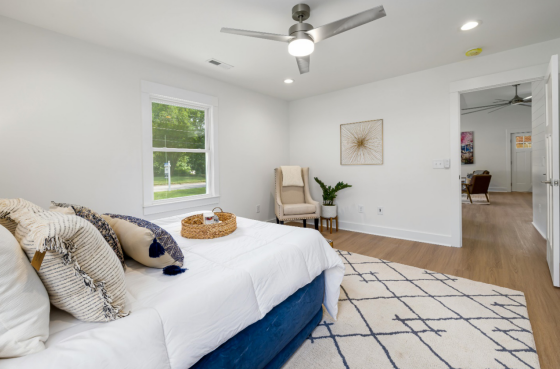
Professional Installation Matters
Even the highest-quality flooring won’t have the desired impact if it’s not installed correctly. Proper flooring installation ensures that your floors will last longer, look more polished, and function as they’re intended. Poor installation can lead to gaps, uneven surfaces, or damage that detracts from the overall appearance and value of the flooring.
Hiring a professional installer is often worth the investment, especially for more complex flooring types like hardwood, tile, or stone. Professionals can help with proper measurements, installation techniques, and finishing touches that ensure your floors are both beautiful and functional. While DIY installation may save you money upfront, the potential for mistakes or subpar results could cost you more in the long run—both in terms of the flooring’s appearance and its resale potential.
Enhance Your Home’s Value with the Perfect Flooring Choice
Whether you’re looking for hardwood flooring installation or affordable vinyl plank flooring, Floorcraft is here to help. Our team of carpet installation experts and local hardwood flooring installers provides professional flooring installation services. Let us guide you in selecting the best flooring options to suit your needs, style, and budget. Reach out today!